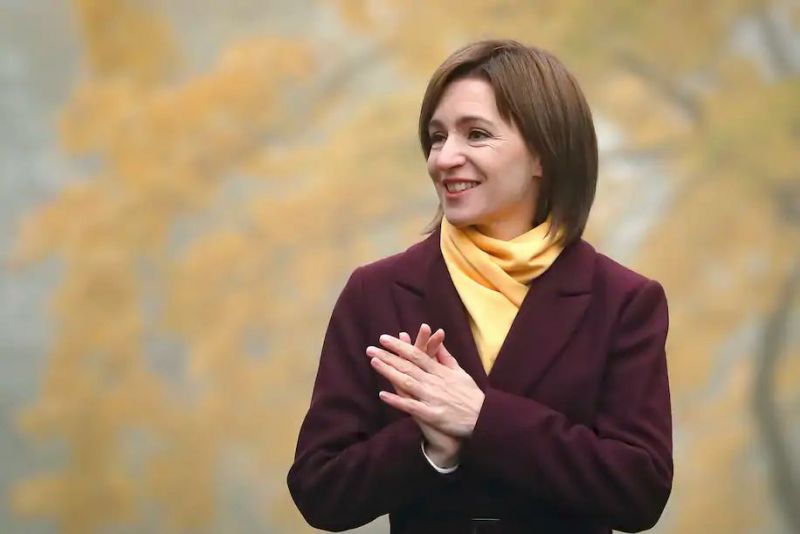
The Republic of Moldova, a tiny nation sandwiched between Romania and Ukraine, held its second-round presidential elections on Nov. 15. The voters ousted the incumbent pro-Russian president, Igor Dodon, electing Maia Sandu, the pro-Western, Harvard-educated former prime minister.
Sandu will become the first female president of this former Soviet republic, population 3.5 million. What shaped her victory, and what does it mean? Here’s what you need to know.
Moldova has deep political divisions
Disagreements about three big issues have shaped Moldova’s politics in recent years — and corruption topped the list. Sandu organized an anti-corruption movement that opposed the oligarchic rule of Vladimir Plahotniuc, a businessman who completely captured the state until he was ousted in 2019 — following the joint political intervention by the United States, the European Union and Russia. Sandu’s movement energized the Moldovan educated classes and the Moldovan diaspora living in the European Union to vote in large numbers.
Second, Moldova has been embroiled in a decades-long fight about national identity. Many within the country consider themselves Romanian — diplomatically and politically, the Romanian government supported the work of Plahotniuc, a Romanian citizen, for instance. Others argue for a distinct Moldovan national identity.
This split has its origins in Moldova’s history. Three-quarters of Moldova’s population speak Romanian, while the remainder are a mix of Russians, Ukrainians and Gagauzians — a Turkic group that converted to Christianity. Moldovan national identity was built up by the Soviet Union, which annexed the region from Romania in 1940, as a result of the Molotov-Ribbentrop Pact, and wanted to split it away from Romania.
And third, the country’s identity divide mirrors current geopolitics. Those who support Russia, including the outgoing president, typically identify as Moldovans and favor a strong relationship with Moscow. Those identifying as Romanians — mostly the country’s bureaucratic and educated elite — including Sandu — seek to align the country with Romania, the European Union and the West. Some Moldovans are ambivalent, paying closer attention to economic issues. This group is more likely to favor ties to the E.U., which they consider a more generous economic partner than Moscow.
Sandu homed in on corruption
Sandu campaigned against the corruption associated with Plahotniuc, who remains an important presence in Moldovan politics. Plahotniuc and his Democratic Party had supported President Dodon in the previous election. While Dodon was not a political ally of the oligarch, many Moldovans considered him a member of a corrupt establishment. For instance, he seemed to admit on video that his Socialist Party was receiving $600,000 to $700,000 per month from Russia. Moldovan prosecutors are still investigating the matter. Under Moldovan law, foreign funding for political parties is illegal.
Sandu became the target of disinformation during the campaign, and pro-Russian media outlets helped the incumbent dominate the airwaves. Nonetheless, she mobilized urban voters and members of the Moldovan diaspora — who retain the right to vote in Moldova’s elections.
Sandu defied pollsters’ predictions, and led by a 3.5 percent margin in the first round of the elections, which took place on Nov. 1. With no candidate winning a majority, Moldova held the second round two weeks later — where Sandu claimed a landslide victory, with 57.7 percent of the vote. Strong support from the Moldovan diaspora throughout the E.U. played a key role in her victory.
The outgoing president still has political support
Moldova has a semi-parliamentary political system, which means that most of the executive power rests in the hands of the prime minister. The current prime minister, Ion Chicu, is a member of Dodon’s party, which now holds 51 out of 101 seats, a slim majority in the legislature. Sandu has already mentioned the possibility of holding snap parliamentary elections. Winning a snap election would mean Sandu’s political coalition could form a new cabinet and implement her ambitious reform agenda.
Sandu’s election is likely to improve Moldova’s relationship with the United States, the E.U. and Romania. Romanian President Klaus Iohannis, for instance, already announced his intention to make an official visit shortly after Sandu’s inauguration.
Relations with Russia may change, with Moscow having less influence over Moldova’s domestic and foreign policy — although Sandu has been careful not to provoke Russian hostility. She pledged to develop relations with Moscow, even as she aligns her country more closely with the West.
Russia will still have some influence in the country, as Moscow effectively controls the breakaway region of Transnistria, which declared its independence from Moldova in 1992. Moldova could be drawn into whatever happens with the frozen conflict in Ukraine, with which it shares a 580-mile border — or get pulled into any broader moves by Russia within the region.
Of course, Russia may behave unpredictably, as some analysts are warning. Neighbors such as Georgia, Ukraine and the Baltic countries have increasingly aligned more closely with the West in recent years. That leaves Belarus, where citizens have been widely protesting rigged elections for more than three months, as one of the few remaining pro-Russian strongholds in the region.
Marius Ghincea is a PhD researcher at the European University Institute, in Florence. His research agenda focuses on issues related to identity and foreign policy, transatlantic relations, and European security. He tweets at @mariusghincea.
